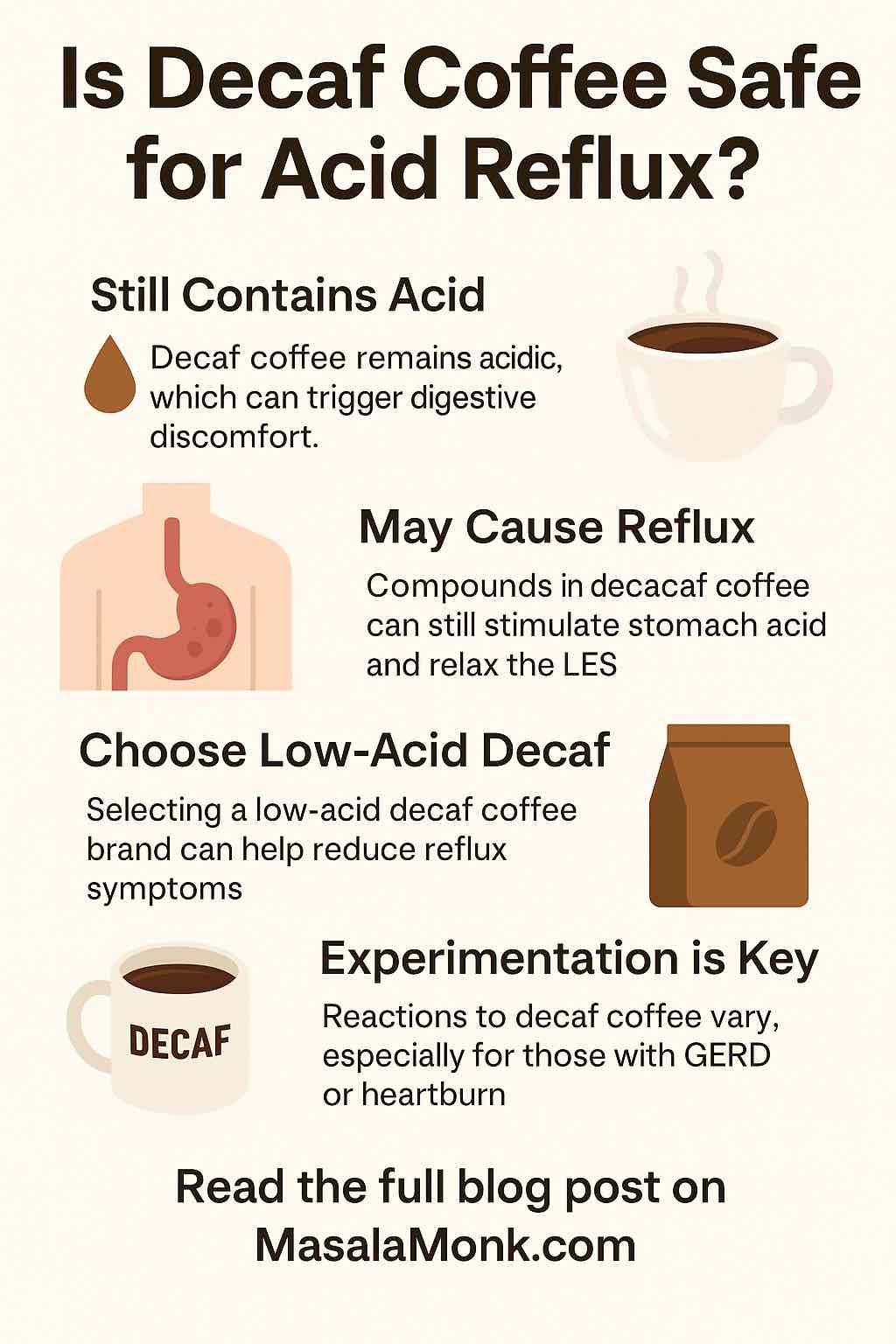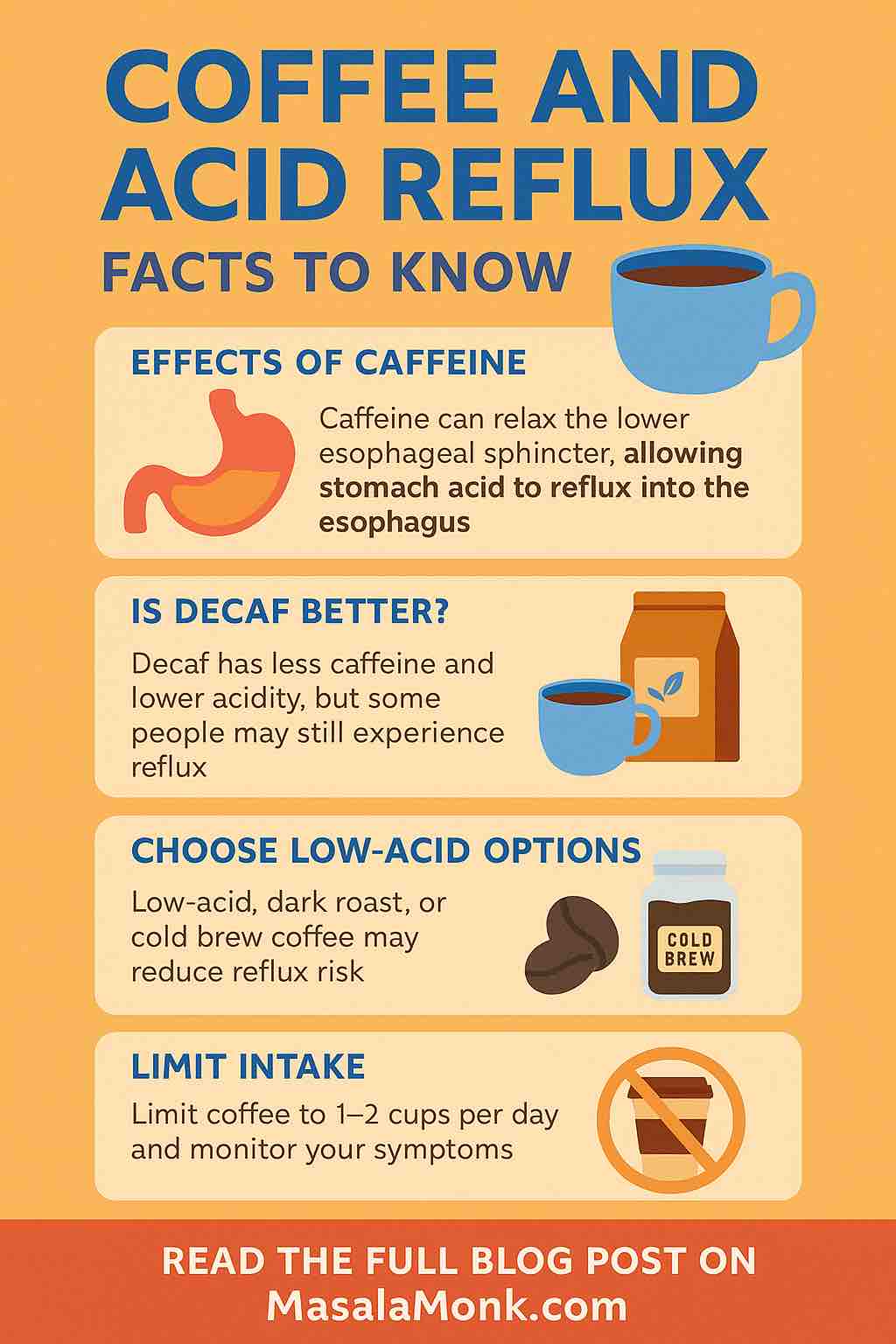
For many, coffee is more than just a beverage — it’s a daily ritual, a source of comfort, and a moment of pause. But for those dealing with acid reflux or GERD (Gastroesophageal Reflux Disease), even the thought of coffee can bring discomfort. While regular coffee is a well-known trigger, decaf coffee often gets pitched as a safer alternative. Yet, the relationship between decaffeinated coffee and acid reflux isn’t as straightforward as it seems.
This article explores the nuanced science and practical realities behind decaf coffee’s impact on acid reflux, GERD, and heartburn. We’ll also uncover what makes some decaf coffees more reflux-friendly than others — and how you can enjoy your cup without compromising your health.
The Hidden Complexity of Coffee and Digestive Health
Coffee — whether decaffeinated or not — contains a complex matrix of compounds: acids, oils, caffeine (to some extent in decaf), and other biologically active molecules. While caffeine is often blamed for triggering reflux, it’s not the only compound that can disturb the digestive system.
Coffee stimulates gastric acid secretion, even in its decaffeinated form. It can also relax the lower esophageal sphincter (LES) — the muscular valve between your esophagus and stomach. When the LES weakens or relaxes at the wrong time, stomach acid can travel upwards, leading to symptoms like heartburn, a sour taste, or chest discomfort — the hallmarks of acid reflux and GERD.
Why Decaf Coffee Is Still Acidic — and Why That Matters
One of the most persistent myths is that decaffeinated coffee is low in acid. In reality, most decaf coffees remain acidic. The acidity in coffee comes from organic compounds such as chlorogenic acid, quinic acid, and citric acid — all of which remain present even after caffeine is removed.
That said, not all acids are equal. Some contribute to flavor complexity, while others, especially chlorogenic acid, are more likely to irritate the stomach lining or stimulate acid production. These acids can trigger digestive discomfort in sensitive individuals, regardless of caffeine content.
How Decaf Coffee Can Still Trigger Reflux
While removing caffeine does eliminate one major irritant, several mechanisms by which decaf coffee can still aggravate reflux include:
- Stimulation of Gastric Acid: Compounds in coffee increase stomach acid levels, which can exacerbate reflux.
- LES Relaxation: Certain substances in decaf coffee may still cause the LES to relax inappropriately.
- Gastric Emptying Delay: Coffee can slow digestion in some people, creating pressure in the stomach that contributes to reflux.
- Bean and Roast Type: The origin and roast of the bean greatly affect the final acidity level of the brew.
The Role of Bean Type, Roast, and Brewing in Reflux Sensitivity
The kind of coffee bean used and how it’s processed can make a significant difference in how your body responds:
🟤 Roast Level
Contrary to what many believe, darker roasts are less acidic than lighter ones. The longer roasting process breaks down some of the acids responsible for sharpness and tang — making dark-roasted decaf a better option for reflux-prone individuals.
🌍 Bean Origin
Beans grown at lower altitudes (like in Brazil or Sumatra) tend to be lower in acid. These beans are naturally smoother and gentler on the stomach compared to those from high-altitude regions like Ethiopia or Colombia.
💧 Decaffeination Method
The method used to remove caffeine can also affect acid content. The Swiss Water Process, for example, is chemical-free and tends to preserve more of the coffee’s original integrity without increasing acidity. It’s often preferred for people with digestive sensitivities.
🧊 Brewing Method
Cold brew is another excellent way to reduce acidity. When coffee grounds are steeped in cold water over a long period, the resulting brew contains significantly less acid — even when using decaf beans.
Low-Acid Decaf Coffee: A Practical Path for Reflux Sufferers
If you’re not ready to give up coffee altogether, there’s good news: you don’t have to. Instead of eliminating coffee, focus on making smarter choices:
- Opt for low-acid labeled decaf coffee. Brands like Lifeboost, Volcanica, and Puroast specialize in low-acid, stomach-friendly blends.
- Choose darker roasts over light ones.
- Go for cold brew when possible — the slower extraction process naturally minimizes acid.
- Avoid drinking on an empty stomach, as this can intensify the acidic impact.
- Limit additives like cream and sugar, which can compound reflux issues.
For many individuals, these small adjustments can lead to noticeable improvements without having to quit coffee entirely.
Decaf Coffee: A Matter of Individual Sensitivity
It’s important to recognize that responses to decaf coffee vary significantly between individuals. Some people with GERD or acid reflux find that switching to a low-acid decaf brew almost completely alleviates symptoms. Others, however, may continue to experience discomfort even with the most gentle varieties.
Your personal threshold for acid, the overall health of your digestive tract, and your diet as a whole will all play a role in how your body responds. What works for one person might not work for another — which is why it’s essential to approach this process with both experimentation and mindfulness.
Final Thoughts: Mindful Enjoyment Over Elimination
Coffee doesn’t have to be your digestive enemy — even if you’re battling reflux or GERD. By understanding the role of acidity, the complexities of decaf, and how to choose the right type of brew, you can reclaim your coffee ritual without discomfort.
Rather than giving up coffee altogether, the smarter approach is customization: find a low-acid, dark-roasted, Swiss-water processed decaf that suits your system, and enjoy it with balance.
The goal isn’t just comfort — it’s preserving your pleasure in the little rituals that make life enjoyable. And for many of us, that includes a warm, aromatic cup of coffee.
FAQs: Decaf Coffee and Acid Reflux
1. Does decaf coffee cause acid reflux?
Decaf coffee can cause acid reflux in some people because it still contains acids that stimulate stomach acid production and can relax the lower esophageal sphincter. However, it usually causes fewer symptoms than regular coffee due to the absence of caffeine.
2. Is decaf coffee acidic?
Yes, decaf coffee remains acidic, though typically less so than regular coffee. The decaffeination process removes caffeine but doesn’t eliminate organic acids like chlorogenic acid, which contribute to acidity.
3. Is decaf coffee better for GERD than regular coffee?
For many GERD sufferers, decaf coffee is a better choice because it lacks caffeine, which is a common reflux trigger. However, the acidity in decaf coffee can still provoke symptoms in sensitive individuals.
4. How can I reduce acid reflux when drinking decaf coffee?
Choose low-acid decaf coffee brands, prefer dark roasts, try cold brew methods, avoid drinking on an empty stomach, and consider adding alkaline additives like a pinch of baking soda to neutralize acidity.
5. What are the best low-acid decaf coffee brands?
Some popular low-acid decaf brands include Lifeboost, Volcanica, Puroast, Mommee Coffee, and Clean Coffee Co. These brands use specific beans and processing methods to minimize acidity.
6. Can drinking decaf coffee cause heartburn?
Yes, decaf coffee can cause heartburn if it triggers acid reflux or relaxes the lower esophageal sphincter. Individual sensitivity varies, so monitoring your symptoms is key.
7. Is cold brew decaf coffee less acidic?
Yes, cold brew coffee, including decaf versions, is typically lower in acid because the cold extraction process produces a smoother, less acidic brew that’s gentler on the stomach.
8. Does the roast level affect decaf coffee’s acidity?
Yes, darker roasts tend to have lower acidity compared to light roasts. Choosing a dark roast decaf can help reduce acid reflux symptoms.
9. What is the Swiss Water Process in decaf coffee?
The Swiss Water Process is a chemical-free method to remove caffeine from coffee beans, preserving flavor and generally resulting in a smoother, less acidic cup ideal for sensitive stomachs.
10. Should people with acid reflux avoid decaf coffee altogether?
Not necessarily. Many people with acid reflux tolerate low-acid, dark roast decaf coffee well. It’s best to experiment with different types and brewing methods while observing how your body reacts.











